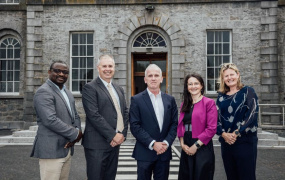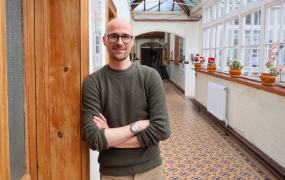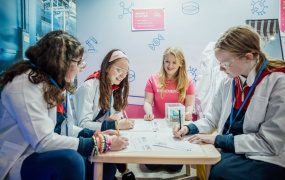Search
Use search box below to look for information on the Mary Immaculate College website. There are some helpful links to common search queries above it. Keep an eye out for the 'Ask a Question' function on certain pages and sections where you can pose specific queries to MIC staff (and see previous questions and answers underneath the question box).
Statement from Professor Eugene Wall, President of MIC.
Professor William Leahy, Dean of the Faculty of Arts at Mary Immaculate College (MIC), has been awarded an Honorary Doctorate by Brunel University in recognition of his services to the London based University.
Hosted in partnership by Mary Immaculate College, University of Limerick and Technological University of the Shannon, and in association with the National Academic Integrity Network, this conference will explore the relationship between Generative AI and Academic Integrity within the Higher Education (HE) sector.
Programme for the Pathways for Access to Higher Education (PATH 1) National Symposium which will take place at Mary Immaculate College Limerick campus on 5 June 2025.
Use the keyword and filters to find your ideal undergraduate, postgraduate, professional development or lifelong learning programme at Mary Immaculate College.
The Mary Immaculate College (MIC) Equality, Diversity, Inclusion and Interculturalism (EDII) Office hosted the EDII Project Awards 2023-2024 Showcase this week where attendees gathered to recognise the impacts of the various funded EDII projects from the last academic year.
Professor Lorraine McIlrath, Director of EDII at MIC, said she hoped that the success of the 20+ projects over the last two years would inspire even more people from the College community to apply for the next round of funding over the coming weeks.
This event featured seven presentations—both in-person and via video—that highlighted successful initiatives that took place across the College and the region. Conducted by staff, students, and community partners, featured projects included:
Neurodiversity and the Academy; The Citizenship Referendum: 20 Years On; Trans Inclusion Workshops for Teacher Education; WOW! The Wonders of Williams: Enabling Children with Williams Syndrome to Create Digital Resources; EDNIP World Café and Learning Exchange Event; Brazilian Urban Instrumental Music from the Late 19th Century and its Entanglements with Race and Gender: A Workshop on Choro; Migrant Parents and Cooking for Cohesion; Traveller Parent Engagement in Science for Fun; Diversity and Intercultural Education Network (DIEN), and Creating Spaces and Events for Learning and Creativity.
MIC College prospectuses have everything you need to know about studying at MIC. You can view interactive versions, download a PDF, or request a copy of our Undergraduate or Postgraduate prospectus.
Visit this page to view the annual reports of Protected Disclosures MIC has published for each calendar year, which outlines the number of protected disclosures made and any actions taken in response to such disclosures. MIC publishes these reports in accordance with Section 22 of the Protected Disclosures Act 2014.
Learn about the Department of Psychology at MIC, and how psychology is studied at undergraduate and postgraduate level. Our undergraduates study psychology either with Liberal Arts programme, the BSc programme or within the joint programme with Education. All three four-year programmes include placement opportunities to gain real world employability skills alongside core psychology content.
Visit this page to learn how Psychology can be taken as part of the MIC Arts Degree as a joint honours combination. Our Psychology programme is accredited and, therefore, studying Psychology as a major at MIC provides students with the basis for graduate membership of the Psychological Society of Ireland.
Under the Data Sharing and Governance Act 2019 (DSGA), a public consultation is required for data sharing agreements between two public sector bodies. Mary Immaculate College is obliged to issue such notices on occasion.
MIC Limerick will open its doors for ‘Arts for All Day’ on 19 March which features an exciting intercultural and inclusive programme of events to suit a variety of interests and ages.
‘Arts for all day’ will comprise workshops and events involving visiting artists, MIC’s artist in residence, Liam McCarthy, and MIC staff and students.
‘Arts for All Day’ Coordinator Dr Dorothy Morrissey said: "The ‘Arts for All Day’ committee is delighted to welcome an array of performers and facilitators for this year’s intercultural arts day. We’re delighted too, to open these events to the general public and are confident that there will be something for everyone; for those who wish to actively participate and for those who simply wish to watch and to listen. There will be opportunities to make with clay, to try out some play writing, to play with masks, and to co-create a house of sounds. There will also be opportunities to be moved by and respond to the voices of others; the voices of Ukrainian women migrants in a research-based lunchtime performance, and the voices of our MAP (MIC’s Ability Pathways) students as they reflect on their experiences in artistic form. Our hope is that ‘Arts for All Day’ will provide an oasis for celebrating, confronting and contemplating our humanity and our diversity in these turbulent times."










